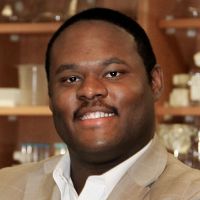The Graduate Program in Life Sciences (GPILS) offers cutting-edge translational research training in basic, biomedical, clinical, and population sciences. We offer seven PhD granting graduate programs and three MS-level programs.
Our graduate programs cover the entire range of biomedical research and life sciences including the basics of protein structure and molecular biology, integrative systems physiology, virology, vaccine development, behavior, cognition, population-based genetics, and the impact of the environment on human health.
Visit our About GPILS page to learn more.
Student Spotlight
 Meet Da'Kuawn Johnson
Meet Da'Kuawn Johnson
Last year, Da'Kuawn was University of Maryland, Baltimore's first recipient of the prestigious Gilliam Fellowship Award through the Howard Hughes Medical Institute. As a part of the award, Fellows create a project that engages their communities in the process of science and scientific discovery.
Da'Kuawn is a student in the Molecular Microbiology and Immunology program. His research in Dr. Nicholas Carbonetti's lab investigates how type III interferon signaling protects young mice from lethal B. pertussis infection.
Dissertation Defenses
Dissertation Defenses
More to come this spring!
Led by

Jessica A. Mong, PhD
Associate Dean for Graduate & Postdoctoral Scholars
Professor, Department of Pharmacology
jmong@som.umaryland.edu
News
January 30, 2026
January 22, 2026
UMB Earns National Carnegie Community Engagement Classification
January 7, 2026
University of Maryland Named Top 10 Public Research Institution
November 25, 2025
November 24, 2025
New Study Identifies Key Mechanism Driving HIV-Associated Immune Suppression
November 6, 2025
November 2, 2025
October 31, 2025
October 28, 2025
October 21, 2025
The Institute of Human Virology Receives $5.5 Million Endowment from the John C Martin Foundation
October 17, 2025
New Monoclonal Antibody Shows Promise for Preventing Malaria Infections
September 30, 2025
University of Maryland School of Medicine Launches Global Health Alliance
August 25, 2025
August 12, 2025
New Protein Therapy Shows Promise as First-Ever Antidote for Carbon Monoxide Poisoning
July 25, 2025
Student Publications
Student Awards and Honors
2025 GPILS/OPS Awards Winners
- MS Scholar Award
- PhD Thesis Project Award
- PhD Scholar Award
- Postdoctoral Fellow Excellence in Research Award
- Postdoctoral Fellow Excellence in Service Award
- Postdoctoral Fellow Excellence in Mentorship Award
- Faculty Excellence in Postdoctoral Mentorship Award
- Teacher of the Year Award
- The Elaine Miye Otani Memorial Award
- Alumnus Award
- The Dr. Mark Shirtliff PhD Student Mentor Award















 Meet Da'Kuawn Johnson
Meet Da'Kuawn Johnson